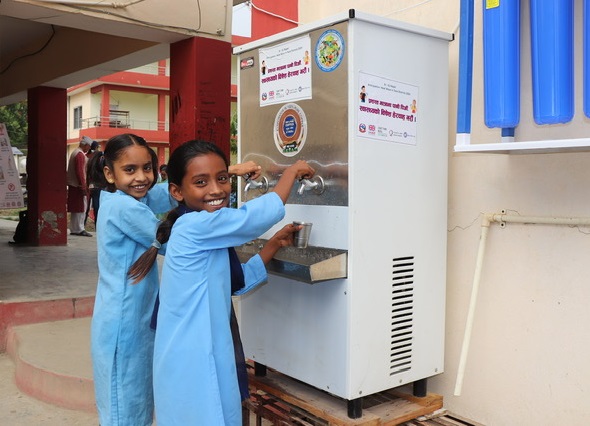The project’s implementation came as Nepal’s Terai region faced what Qatar Charity described as “an unprecedented challenge with a severe heatwave” during the current summer season, with temperatures rising above 43 degrees Celsius.
Qatar Charity (QC) has implemented “a heatwave resilience” project in Nepal’s rural communities that benefitted more than 9,000 people with the financial support of UK Aid and START Fund Nepal.
In a statement on Wednesday, QC said it implemented the project across Nepal’s Banke, Bardiya and Kailali districts by distributing essential items, installing water coolers and placing 350 ceiling fans in schools where students are most vulnerable to the heat.
Some of the items included Oral Rehydration Solution (ORS), glucose, water bottles, umbrellas, mosquito nets and food vouchers.
QC also built water coolers with UV filtration systems in schools and public institutions as well as water ATMs to ensure better access to drinking water.
The projects involved holding awareness sessions among the targeted communities about heat waves and the necessary preventive measures.
“Qatar Charity, through this project, aims to mitigate the impact of heatwaves on rural communities and enhance their resilience by organising public awareness campaigns and addressing the needs of vulnerable populations,” the Qatari entity said.
The project’s implementation came as Nepal’s Terai region faced what QC described as “an unprecedented challenge with a severe heatwave” during the current summer season, with temperatures rising above 43 degrees Celsius.
Health facilities within the Terai region are facing cases of vomiting, urinary infections, heat cramps, exhaustion and fainting due to the scorching temperatures.
Last year, the Terai region hit record breaking temperatures of above 40 degrees Celsius, which has not been reached in the past four decades.
In April, the World Meteorological Organization (WMO) said that extreme heat is becoming more severe in Asia due to climate change, warning that the region is “warming faster than the global average.”
“Climate change exacerbated the frequency and severity of such events, profoundly impacting societies, economies, and, most importantly, human lives and the environment that we live in,” Celeste Saulo, WMO’s Secretary-General, said at the time.







